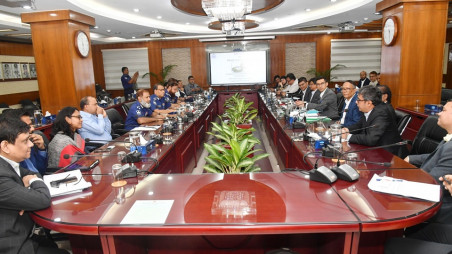Foreign Investor Safety in Bangladesh
Government Steps Up to Protect International Businesses with Emergency Contact Line. In a timely show of unity and assurance, the Government of Bangladesh has taken a bold step to reinforce the safety and confidence of foreign investors by introducing a dedicated emergency contact line. The decision comes in response to recent unrest that disrupted several multinational businesses earlier this month.
A Meeting That Meant More Than Words
On Monday, senior government and police officials sat with top executives from seven global companies at the Police Headquarters in Dhaka. This was not a routine meeting. It was a conversation that carried emotion, urgency, and responsibility.
Inspector General of Police Baharul Alam and Bangladesh Investment Development Authority (BIDA) Executive Chairman Chowdhury Ashik Mahmud Bin Harun listened closely as companies like Nestle, Coca-Cola, Unilever, Bata, Reckitt Benckiser, PepsiCo and Jubilant FoodWorks shared how their operations were shaken by violence during the protests on 7 and 8 April.
These brands are deeply embedded in the country’s economy and community. Beyond business, they provide thousands of jobs and support countless families. Their distress was felt not just in boardrooms but across supply chains and households.
To ease fears and offer protection moving forward, the IGP announced a dedicated emergency hotline exclusively for foreign investors. This direct line connects businesses to senior police officers, ensuring fast and effective responses to any threat or incident.
“We are not just responding to a problem. We are here to rebuild trust and make sure this never happens again,” said IGP Baharul Alam. The police also confirmed that over 140 arrests had been made following the vandalism, with multiple cases underway.
They emphasized a zero-tolerance approach moving forward. BIDA Executive Chairman Ashik emphasized that this engagement was more than a government obligation. It was a promise to stand by those who believe in Bangladesh.
Read More: Southeast University: A Knowledge Hub and Center of Holistic Development of Bangladesh
“This wasn’t just a meeting. It was a statement. It shows that Bangladesh is serious about walking with investors during every chapter is good or bad,” he said. He added that the companies present are essential pillars of Bangladesh’s economy, and harming them means harming the livelihoods of ordinary citizens.
One of the most powerful outcomes of the meeting was a joint agreement to move from reaction to prevention. Police, BIDA, and business representatives developed a forward-looking action plan. It includes the setup of rapid response units, better security protocols, and seamless crisis communication channels. These strategies aim to prevent future unrest from affecting business operations and community stability.
A company executive who attended the meeting said afterward, “We know how to deal with market losses, but when people are physically threatened or facilities are damaged, it goes beyond business. The government’s support gives us the strength to continue.”
BIDA’s Confidence in a Resilient Bangladesh
The mood after the meeting was one of cautious optimism. Many company leaders expressed gratitude for the government’s immediate response and its genuine willingness to listen. Several affirmed that their long-term plans for expansion in Bangladesh remain unchanged.
The initiative aligns with BIDA’s broader mission of making Bangladesh a safe, sustainable, and investor-friendly destination. As the country continues its journey toward becoming a regional trade and manufacturing hub, the focus on investor protection has never been more critical. This is not just a policy it is a promise. A promise that Bangladesh will walk beside its investors, through every storm and every success, hand in hand.


















